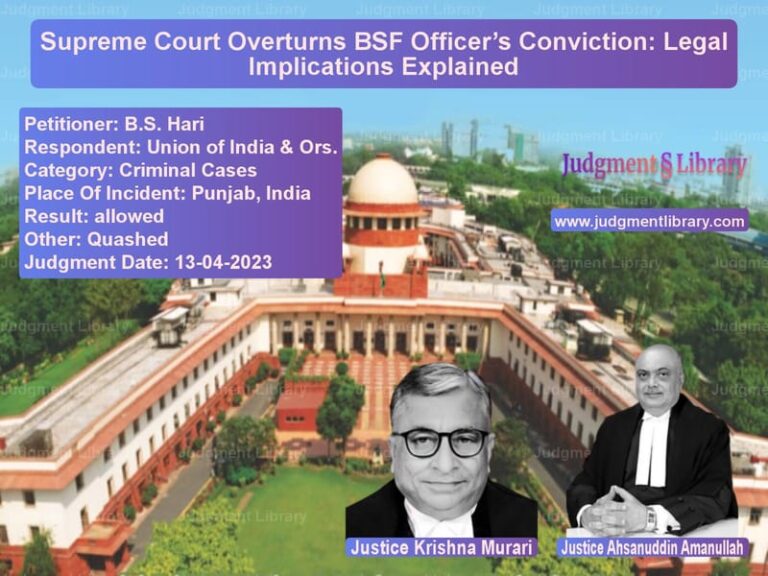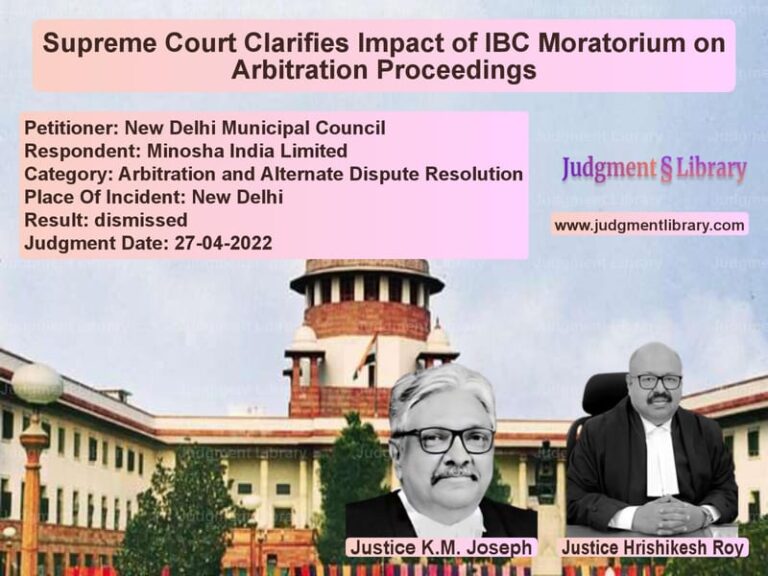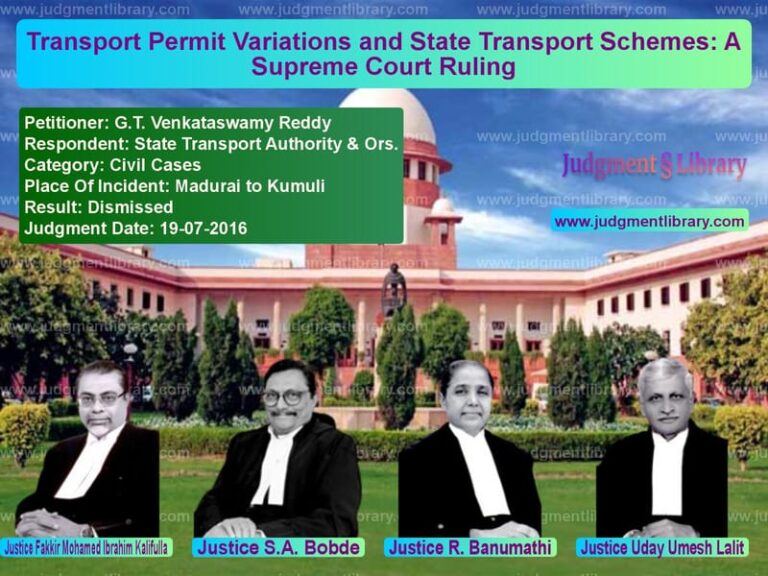Delayed Wage Payments Under MGNREGA: Supreme Court’s Landmark Judgment
The case of Swaraj Abhiyan vs. Union of India & Ors. is a crucial judgment that addresses the inefficiencies in the implementation of the Mahatma Gandhi National Rural Employment Guarantee Act, 2005 (MGNREGA). The petition brought forth key issues regarding delayed wage payments, reduced work allocations, and lack of social audits. The Supreme Court’s judgment laid down important directives to ensure the effective implementation of the scheme and to uphold the rights of rural workers.
Background of the Case
MGNREGA was enacted to provide at least 100 days of guaranteed wage employment per financial year to every rural household whose adult members volunteer to perform unskilled manual work. Despite the clear provisions of the Act, issues regarding delayed payments, underfunding, and inadequate social audits had persisted.
The petitioner, Swaraj Abhiyan, raised concerns about three primary issues:
- Delays in wage payments and non-payment of compensation for late disbursements.
- Reduction in person-days and allocation of funds below the projected demand.
- Failure to conduct mandatory social audits.
The Supreme Court’s intervention was sought to ensure that MGNREGA was implemented in its true spirit and that workers were not deprived of their rightful earnings.
Key Issues and Arguments
1. Delay in Wage Payments and Compensation
The petitioner contended that despite the Act’s clear provision for timely wage payments, numerous workers faced delays beyond the stipulated 15-day period. Furthermore, compensation for delayed payments, as mandated by Paragraph 29 of Schedule II of the Act, was either not paid or significantly delayed.
According to the petitioner:
- The wage cycle involved multiple stages, including data entry, approval, and fund transfers, which often caused unnecessary delays.
- The delay was exacerbated by inefficiencies in the Public Fund Management System (PFMS) and administrative red tape.
- The government failed to account for delays caused at the Central Government level when processing wage payments.
The Supreme Court took serious note of this and remarked:
“The law requires and indeed mandates payment of wages not later than a fortnight after the date on which the work was done by the worker or labourer. Any reason for the delay in receiving wages is not at all the concern of the worker.”
2. Reduction in Person-Days and Allocation of Funds
MGNREGA mandates that every household seeking work should be provided at least 100 days of employment. However, the petitioner argued that the Central Government arbitrarily capped person-days and imposed an ‘Approved Labour Budget’ without considering the real demand for work.
The petitioner further stated:
- The ‘Approved Labour Budget’ mechanism violated the spirit of the Act, which does not empower the Central Government to impose such limits.
- The State Governments estimated demand based on ground-level data, yet their projections were unilaterally reduced.
- Many willing workers were denied employment because the system halted muster roll generation after reaching the budgeted cap.
The Supreme Court disagreed with the argument that the Central Government was arbitrarily capping funds, noting that states had the right to request additional funds if needed. The Court observed:
“The release of funds is for a good socio-economic cause and therefore expeditious and sufficient availability of funds should be the objective.”
3. Absence of Social Audits
MGNREGA mandates regular social audits to ensure transparency and accountability. However, the petitioner argued that social audits were either not being conducted or were ineffective. The Supreme Court emphasized the need for meaningful audits to curb corruption and mismanagement.
Supreme Court’s Judgment and Directives
The Court delivered a strongly worded judgment highlighting the deficiencies in MGNREGA’s implementation. The key takeaways from the ruling are:
1. Mandatory Payment of Wages and Compensation
- Workers must receive their wages within 15 days of completing work.
- If wages are delayed, compensation of 0.05% per day of delay must be paid as per Paragraph 29 of Schedule II of the Act.
- The responsibility for paying compensation lies jointly with the State and Central Governments.
2. Allocation of Funds and Removal of Caps
- The Central Government was directed to ensure that all genuine demands for work were met.
- States were given the authority to seek additional funds without unnecessary restrictions.
- The Court rejected the petitioner’s argument that fund allocation was entirely arbitrary but emphasized that no worker should be denied employment due to budgetary constraints.
3. Strengthening Social Audits
- The Court stressed the importance of social audits to prevent corruption.
- States were directed to conduct timely audits and publish reports.
- Failure to conduct audits would invite action from the Court.
Impact of the Judgment
The ruling is a significant step towards improving MGNREGA’s implementation and protecting workers’ rights. Some of the expected outcomes include:
- Timely disbursement of wages to rural workers.
- Improved transparency and accountability in fund allocation.
- Greater participation of states in planning and execution.
- Better enforcement of social audit mechanisms.
Conclusion
The judgment in Swaraj Abhiyan vs. Union of India & Ors. serves as a landmark ruling in labor rights and social welfare legislation. By ensuring that workers receive timely wages and removing arbitrary caps on employment days, the Court has reinforced the fundamental principles of MGNREGA.
While the Supreme Court has laid down clear directives, the real challenge lies in their implementation. It is now up to the government and administrative bodies to ensure that MGNREGA functions as intended, providing rural households with guaranteed employment and financial security.
Petitioner Name: Swaraj Abhiyan.Respondent Name: Union of India & Ors..Judgment By: Justice Madan B. Lokur, Justice N.V. Ramana.Place Of Incident: India.Judgment Date: 18-05-2018.
Don’t miss out on the full details! Download the complete judgment in PDF format below and gain valuable insights instantly!
Download Judgment: Swaraj Abhiyan vs Union of India & Ors Supreme Court of India Judgment Dated 18-05-2018.pdf
Direct Downlaod Judgment: Direct downlaod this Judgment
See all petitions in Employment Disputes
See all petitions in Public Sector Employees
See all petitions in Pension and Gratuity
See all petitions in Judgment by Madan B. Lokur
See all petitions in Judgment by N.V. Ramana
See all petitions in partially allowed
See all petitions in Modified
See all petitions in supreme court of India judgments May 2018
See all petitions in 2018 judgments
See all posts in Service Matters Category
See all allowed petitions in Service Matters Category
See all Dismissed petitions in Service Matters Category
See all partially allowed petitions in Service Matters Category







